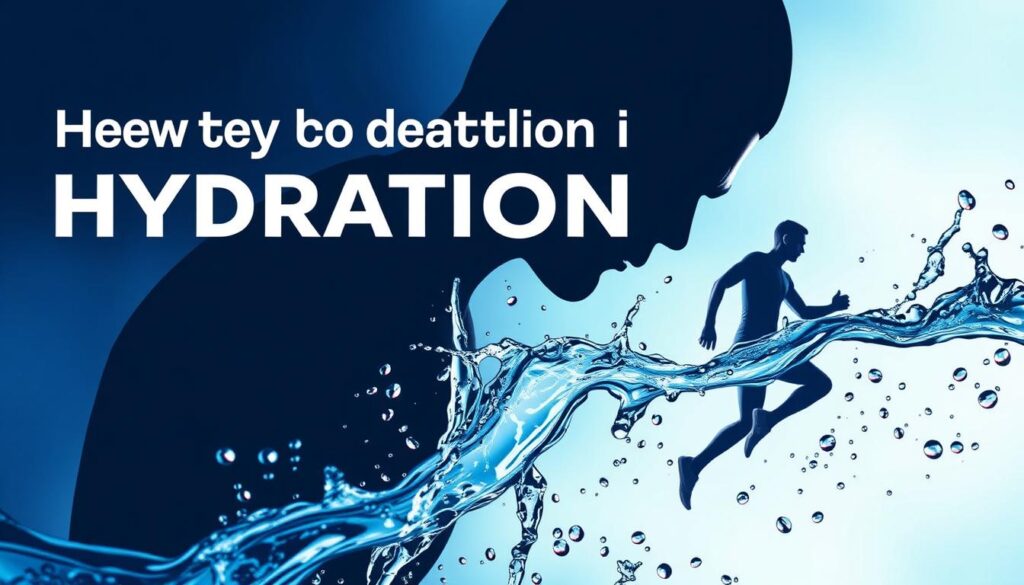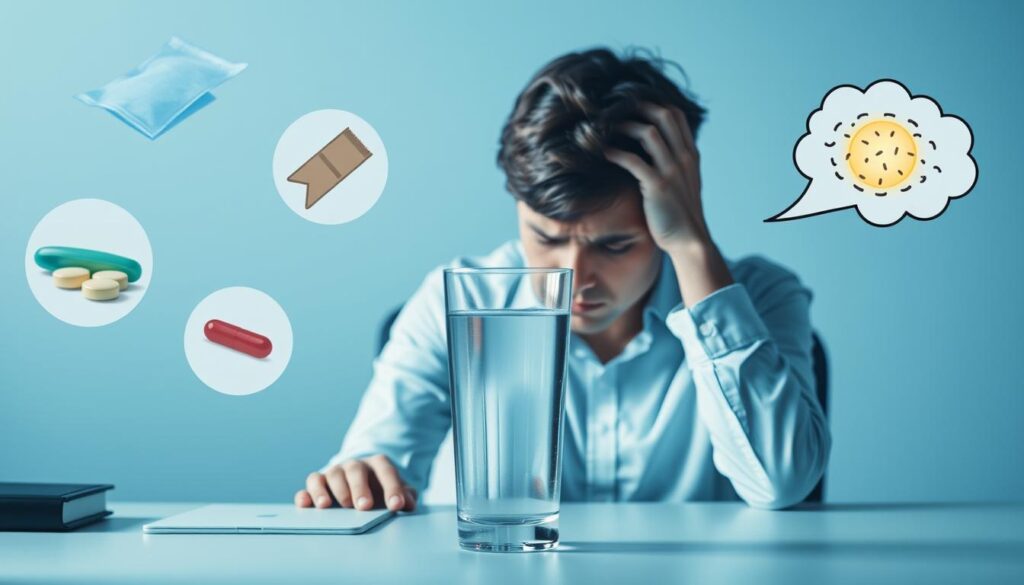Did you know that drinking enough water is key for managing your weight? Our bodies are about 60% water, making it vital for health. Drinking water often can help you lose weight and live healthier.
Drinking water can boost your metabolism and help burn more fat. Just a 1% increase in daily water can cut down calories. Drinking water before meals also helps control hunger, reducing snacking.
Water is crucial for your workout performance, which is important for losing weight. When you exercise, you lose 6-10% of your body weight as water. Staying hydrated keeps you from getting tired, helps you perform better, and lowers stress.
Also, water is key for your brain and energy. Even a small lack of water can make you feel tired, confused, and irritable. Drinking enough water keeps your brain sharp and your energy up, helping you stay on track with your weight loss.
Key Takeaways
- Water makes up about 60% of the human body, making hydration crucial for overall health and weight management.
- Drinking water before meals can suppress appetite and reduce calorie intake.
- Increasing daily water intake by just 1% can lead to a reduction in average calories consumed.
- Proper hydration during exercise prevents muscle fatigue, maintains performance, and reduces oxidative stress.
- Mild dehydration can compromise cognitive function and energy levels, making it harder to stick to weight loss goals.
Staying Hydrated Helps Maximize Physical Performance
Drinking enough water is key to doing your best in sports. When you’re hydrated, your body can keep its temperature stable, stay motivated, and feel less tired. This makes it easier to move and work out.

Dehydration Can Significantly Impair Exercise Performance
Even losing just 2% of your body’s water can hurt how well you exercise. It makes it harder to control your body’s temperature, lowers your drive, and makes you feel more tired. This makes working out harder, both in your body and mind.
Research shows that 75% of Americans don’t drink enough water, showing many people ignore the need for hydration.
Here’s how dehydration affects your performance:
- It messes with how your body cools down when you sweat.
- LOSING 1-3% of your body weight in fluids can hurt your brain’s function.
- Since muscles are mostly water, staying hydrated is crucial for exercise or hard work.
Optimal Hydration Prevents Muscle Fatigue and Oxidative Stress
Keeping your body well-hydrated is key to avoiding muscle tiredness and lowering oxidative stress from intense workouts. Since muscles are mostly water, it’s important for athletes and those who work out to drink enough.
| Demographic | Daily Fluid Intake Recommendation |
|---|---|
| Females | 2.2 L (74 oz) or 9 cups (8 oz each) |
| Males | 3 L (101 oz) or 13 cups (8 oz each) |
Following these daily fluid intake guidelines helps keep your body hydrated. This supports your best performance and reduces muscle fatigue and oxidative stress during exercise.
Water Intake Significantly Affects Energy Levels and Brain Function
Drinking enough water is key to keeping energy up and the brain working right. Even a small loss of water, about 1-3% of your body weight, can make you feel bad, think less clearly, and forget things. Not drinking enough water can also make headaches worse, which can hurt your thinking and feeling good.
Studies show that not drinking enough water hurts how well you think. When you’re not hydrated, you might find it hard to remember things, pay attention, and feel tired. This is true for people of all ages, from kids to seniors. Drinking enough water is important to keep your mind sharp and stay healthy.
“Losing just 1% of the body’s water can throw off cognitive performance.”
How water affects the brain is really interesting. Here are some key points:
- Losing just 1% of the body’s water can make you less sharp.
- Being 1.4% less hydrated can make it harder to focus, a study found.
- 2% less fluid in your body can make you feel tired, work harder, and have trouble staying cool.
To keep your energy up and your brain working well, you should drink a certain amount of water each day. Here’s what you should aim for:
| Gender | Total Daily Water Intake | Water from Beverages | Water from Food |
|---|---|---|---|
| Men | 15.5 cups (125 ounces) | 12.5 cups (100 ounces) | 3 cups (25 ounces) |
| Women | 11.5 cups (91 ounces) | 9 cups (73 ounces) | 2.5 cups (18 ounces) |
Drinking enough water is important for a healthy brain, lots of energy, and good thinking. Meeting your daily water needs can help you stay sharp, feel great, and be more productive.
Drinking Water May Help Prevent and Treat Headaches
Many people deal with headaches and migraines. But, did you know that drinking enough water can help? Dehydration often causes headaches, and drinking more water might ease symptoms and lower headache and migraine frequency.

Studies show that losing 1-3% of your body weight in water can hurt brain function and cause headaches. Drinking enough water keeps your brain working well and lowers headache risk.
Dehydration Can Trigger Headaches and Migraines
Dehydration messes with your body’s fluid balance, making blood volume go down. This can cut blood flow to the brain, causing headaches and migraines. It can also make the brain shrink away from the skull, activating pain receptors and causing headaches.
Drinking enough water is key to avoiding dehydration headaches and migraines. Aim for eight 8-ounce glasses of water a day, but adjust based on your age, sex, activity, and climate. Staying hydrated can cut down on headaches and migraines.
Increased Water Intake May Reduce Headache Symptoms
Drinking more water can also help treat headaches. A study in Family Practice found that drinking 50.7 ounces (1.5 liters) more water daily helped headache sufferers a lot. Those who drank more water saw a 47% improvement in headaches, while the control group saw only 25% improvement.
More studies are needed to fully understand how water helps with headaches. But, staying hydrated is a simple way to ease headache symptoms. Use a reusable water bottle, drink water regularly, and eat water-rich foods like fruits and veggies to stay hydrated and reduce headache risk.
For more on water’s benefits for weight loss and health, visit https://www.waterdiet.com/boost-weight-loss-how-drinking-water-can-help/.
| Headache Type | Prevalence | Potential Dehydration Link |
|---|---|---|
| Tension Headaches | Most common type, affecting up to 78% of the population | Mild dehydration can contribute to the development of tension headaches |
| Migraines | Affect approximately 12% of the population | Dehydration is a known trigger for migraines in susceptible individuals |
| Cluster Headaches | Relatively rare, affecting about 1 in 1,000 people | While the exact cause is unknown, maintaining proper hydration may help manage symptoms |
Drinking enough water is a good way to prevent and treat headaches and migraines. By knowing how dehydration affects these conditions, you can keep your hydration up and support your brain health.
Water Consumption Can Aid in Relieving Constipation
Constipation is a common issue that makes bowel movements hard and stool passing tough. It affects people of all ages. Diet, exercise, and some medicines can cause it. But, staying hydrated is key to keeping your bowels working right. Drinking more water can help ease constipation and keep your bowel movements regular.
Low Water Intake Is a Risk Factor for Constipation
Not drinking enough water is a big risk for constipation, for both young and old. In fact, 80% of those in long-term care have constipation issues. Without enough fluids, the colon takes more water from the stool, making it hard to pass. Drinking water helps keep your stool soft and bowel movements regular.
Mineral Water Rich in Magnesium and Sodium Improves Bowel Movement
Mineral water, especially with magnesium and sodium, can help with constipation. Magnesium makes the stool softer and easier to pass. Sodium helps magnesium work better. Drinking this water can ease constipation without harsh medicines. But, talk to your doctor before changing your diet or hydration, especially if you have health issues or take certain medicines.
Drinking enough water is crucial for avoiding and treating constipation. Try to drink fluids all day, mainly water, to keep your digestive system running smoothly. Aim for at least 8 cups (64 ounces) of water daily. You can also eat water-rich foods like cucumbers, watermelon, and strawberries. Staying hydrated helps with healthy bowel movements and eases constipation.




